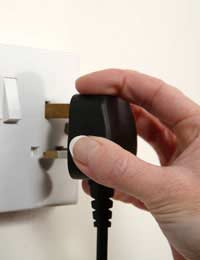Obsessive Checking Explained

Many people sometimes feel the need to go back and check certain things, but for some OCD sufferers, this can be much more extreme. Compulsive checking is one of the common symptoms of OCD. The repetition of checking things such as doors, windows and electrical appliances to make sure that they are shut, locked or switched off can quickly become an obsession.
Examples of Obsessive Checking
Compulsive checking rituals can take a wide range of different forms, but some common examples include:- Checking that doors and windows are properly secured
- Checking that electrical appliances are switched off
- Checking that the security alarm is set
- Checking in with friends and family to make sure that they are safe
What Causes Obsessive Checking?
The compulsion to check objects often stems from obsession. Intrusive thoughts will often suddenly enter the mind and are difficult to shift. This results in repetitive checking to try to “silence” the intrusive thoughts. With those who do not suffer from OCD, checking once is usually enough to “silence” the niggling doubt that an electrical appliance has been left on or the door is not locked, but things are not so simple for OCD sufferers. The doubts remain, despite frequent checking. In many cases, the obsession is related to fears that something bad will happen if the checking rituals are not performed frequently. For example, the house may burn down (if an electrical appliance has been accidentally left on, and this has not been checked) or a burglar may gain access to the house (if the door is not locked).Treatment for Obsessive Checking
Cognitive Behavioural Therapy is a common form of treatment for OCD obsessions and compulsions. It aims to train the brain that compulsive rituals do not need to be performed to reduce anxiety. OCD sufferers are often encouraged to do something that would usually be immediately followed by a compulsive ritual. For obsessive checking, this can involve only being allowed to perform one compulsive check. After this, no further checks can be carried out. This is intended to show that nothing bad will happen if checks are not done on a frequent basis. Being prevented from carrying out compulsive checks can be distressing in the short term, many OCD sufferers find that it helps in the long term by disproving their fears.Obsessive checking is one of the frequently experienced symptoms of OCD. It involves the repetition of compulsive rituals such as checking that doors and windows have been locked, or that electrical appliances have been turned off or unplugged. It is common for OCD sufferers to actually return home to check that this is the case.
In some cases, several journeys may be made back and forth to check that things are as they should be. No matter how many times the checks are performed, there is still a niggling doubt that the check was not done properly. For many OCD sufferers, the repetition becomes a prominent obsession that can leave them feeling slightly crazy.
Related Articles in the 'Symptoms' Category...
- What If Your Compulsive Thoughts Are Making You Suicidal?
- Praying and Confessing Compulsions
- Quiz: Is Your Child Suffering from OCD?
- Quiz: Do You Have Pure 'O' OCD?
- Compulsive Buying
- Obsessive Tidiness
- Repeatedly Performing Tasks
- Dealing With Intrusive Thoughts and Paranoia
- Common OCD Obsessions
- Being Unable to Stop Hoarding
- What To Do if OCD Leads to Self-harm
- Obsessive Cleanliness
- Avoiding Stressful Situations
I have this disorder when i was a younger it was compulsion on repeating. Then checking, ive been fighting it hard and slowly was able to control my compulsions,, you can do it.
Kate - 26-Sep @ 2:29 PM


Re: How to Survive a Holiday as an OCD Sufferer
I’ve had severe OCD for 49 years. Had all sorts of treatment, but with no success I would be very interested to…
Re: How Alcohol Affects OCD
CAInHI - Your Question:Scared today. I have been drinking some, and my intrusive thoughts of harming others is so potent. I HAVE to stop…
Re: How Alcohol Affects OCD
Scared today. I have been drinking some, and my intrusive thoughts of harming others is so potent. I HAVE to stop drinking. I love it, I…
Re: How Alcohol Affects OCD
gee8 - Your Question:Lately I have been thinking really weird thoughts like for example: I can see an attractive person and think they're…
Re: How Alcohol Affects OCD
Lately I have been thinking really weird thoughts like for example: I can see an attractive person and think they're attractive, and a…
Re: Relationship OCD
I am really hoping somebody would help me out here I am a 17 year old and I've been through 2 significant OCD phases before both of them were…
Re: How Alcohol Affects OCD
Hi I am convinced that I'm ocd and I'm a drinker but what I want to know is, has anyone suffering ocd got so drunk that they got on a…
Re: Relationship OCD
I thought the situation I just went through would be a perfect example to put on this site. I was recently dumped by a girl after two months of…
Re: How Alcohol Affects OCD
@AJ ! Your msg makes so much sense. I was just thinking tonight after sooo long of being addicted to alcohol that maybe i just feel…
Re: Relationship OCD
I wanted to write you cause my now ex boyfriend had ROCD. he was diagnosed with OCD when he was very young and also with an anxiety disorder. We…